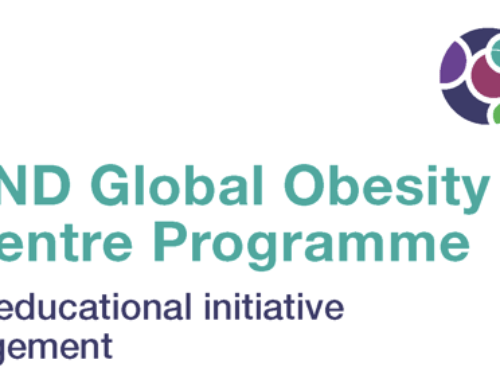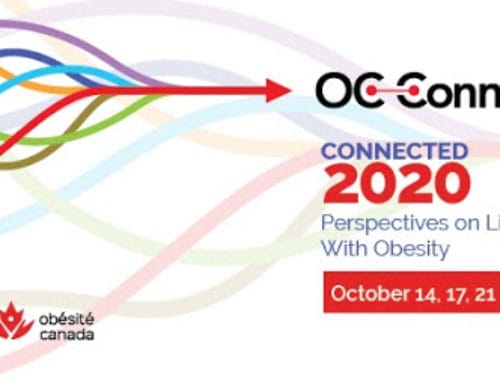In this series, we have identified that “healthy weight” social messages[1] exist in our society that inaccurately support the belief that higher body weights are unhealthy and that people can easily change their body weights by changing their behaviours. In reality, we have learned that healthy people come in all shapes and sizes and that our body weight is incredibly complex. We have also learned that individuals with large bodies are often blamed for their body size and are victim to numerous stereotypes, including the belief that they are lazy and unintelligent. Blame and stereotypes towards individuals with obesity are part of what is called weight stigma.
Weight stigma is defined as encompassing the inaccurate and negative beliefs and stereotypes about people with obesity, physical barriers for people with larger bodies (such as narrow chairs or medical equipment that is too small) as well as discrimination towards people with obesity. Researchers studying weight stigma have documented it in all aspects of the lives of people with large bodies, including their success in education and the workplace, the quality and quantity of their health care, and the quality of their familial, friend, and romantic relationships[2]. Weight stigma is also commonly found in the media[3], which perpetuates the stereotypes and negatives beliefs about individuals with obesity and reinforces “healthy weight” social messages.
Researchers examining other forms of stigma and discrimination have found that being on the receiving end of these attitudes, beliefs, and behaviours is associated with significant health consequences[4]. It is no different for weight stigma. The experience of weight stigma is associated with symptoms of depression[5], both binge-eating[6] and restricted eating[7] behaviours, poorer self-reported health[8], increased stress[9], and reduced life expectancy[10].
Despite the evidence outlined in this blog series that discredits “healthy weight” messaging, these messages as well as weight stigma remain strong and prevalent in our society and are harmful to people living with obesity. It is easy to see how resistant these attitudes are to change when reading about backlash to anything labelled as body positivity (see Jillian Michael’s stigmatizing reaction to Lizzo[11] as one example). These instances of backlash highlight that there is work left to be done in reducing weight stigma, which is the focus of the final post in this series.
Sarah Nutter, PhD.
Postdoctoral Scholar, University of Calgary
Obesity Canada EveryBODY Matters Committee
References:
[1] Rodgers, R. F. (2016). The role of the “healthy weight” discourse in body image and eating concerns: An extension of sociocultural theory. Eating Behaviors, 22(August 2016), 194-198. https://doi.org/10.1016/j.eatbeh.2016.06.004
[2] Nutter, S., Russell-Mayhew, S., Arthur, N., & Ellard, J. H. (2018). Weight bias as a social justice issue: A call for dialogue. Canadian Psychology, 59, 89-99. doi:10.1037/cap0000125
[3] Inhorn, S., & Boyce, T. (2010). ‘It’s disgusting how much salt you eat!’: Television discourses of obesity, healthy, and morality. International Journal of Cultural Studies, 13, 83-100. doi: 10.1177/1367877909348540
[4] Livingston, J. D., & Boyd, J. E. (2010). Correlates and consequences of internalized stigma for people living with mental illness: A systematic review and meta-analysis. Social Science & Medicine, 71, 2150–2161. doi:10.1016/j.socscimed.2010.09.030
[5] Stevens, S. D., Herbozo, S., Morell, H. E. R., Schaefer, L. M., & Thompson, J. K. (2016). Adult and childhood weight influence body image and depression through weight stigmatization. Journal of Health Psychology, 22, 1084-1093. doi:10.1177/1359105315624749
[6] Durso, L. E., Latner, J. D., White, M. A., Masheb, R. M., Blomquist, K. K., Morgan, P. T., & Grilo, C. M. (2012). Internalized weight bias in obese patients with Binge Eating Disorder: Associations with eating disturbances and psychological functioning. International Journal of Eating Disorders, 45, 423-427. doi:10.1002/eat.20933
[7] Jendrzyca, A., & Warschburger, P. (2016). Weight stigma and eating behaviours in elementary school children: A prospective population-based study. Appetite. Advance online Miller, W. C. (2005). The weight-loss-at-any-cost environment: How to thrive with a health centered focus. Journal of Nutrition Education and Behaviour, 37, s89-s93. doi:10.1016/S1499-4046(06)60205-4
[8] Pearl, R. L., White, M. A., & Grilo, C. M. (2014). Weight bias internalization, depression, and self-reported health among overweight binge eating disorder patients. Obesity, 22, E142-E148. doi:10.1002/oby.20617
[9] Tomiyama, A. J., Epel. E. S., McClatchey, T. M., Poelke, G., Kemeny, M. E., McCoy, S. K. & Daubenmier, J. (2014). Associations of weight stigma with cortisol and oxidative stress independent of adiposity. Health Psychology, 33, 862-867. doi:10.1037/hea0000107
[10] Sutin, A. R., Stephan, Y., & Terracciano, A. (2015). Weight discrimination and risk of mortality. Psychological Science, 26, 1803-1811. doi:10.1177/0956797615601103
[11] Esmonde, K. (2020, January 15). What celeb trainer Jillian Michaels got wrong about Lizzo and body positivity. Retrieved from https://www.vox.com/culture/2020/1/15/21060692/lizzo-jillian-michaels-body-positivity-backlash






